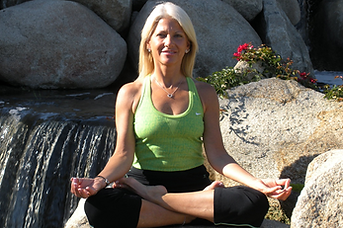
Yoga for Anxiety and Depression
by Temecula psychologist Linda Comin, Psy.D.
Yoga is an ancient mind-body practice with origins in Eastern Indian Philosophy. The word yoga in Sanskrit actually means to yoke or unite. Yoga combines physical postures (asanas) with breath-work (pranayama) and meditation (dhyana), concentration (dharana), relaxation, balance, strength, and stamina. Current research on yoga suggests that it improves mood and gives a general sense of well-being. It is beneficial in counteracting stress and reducing heart rate, respiratory rate and blood pressure.
Yoga for Anxiety
Many people suffer from anxiety and panic attacks. Anxiety can be a useful emotion if it heightens your awareness to make healthier choices. However, when anxiety becomes more than a little nervousness, it can be very debilitating. Sufferers of anxiety and panic disorders complain of exhaustion and mental fatigue. Some of these symptoms include obsessive thinking, insomnia, migraines, intestinal problems, dizziness, nausea, and shortness of breath and heart palpitations. The appearance of anxiety in your

daily life can drastically influence your lifestyle. Research suggests that excessive worry sabotages the immune system, weakening the body’s ability to fight off disease and heal.
Yoga is effective in treating anxiety by reducing the symptoms. One of yoga’s basic tenants is to turn your focus inward, letting the external world go. Focusing within facilitates recognition of what may be triggering the anxiety, which is usually those habitual thoughts and unresolved conflicts.
Yoga breath work is one of the key methods in counteracting anxiety. Breath is life and puts us in touch with our essence. When threatened, real or imagined, our bodies react. Therefore, during an anxiety attack the body reacts to what is perceived as a threat. This results in tension, rigidity, and choppy, constricted or cessation of breath. Yoga teaches you to slow down your breath, relax your body, and look inward at the precipitating event.
Yoga for Depression
The benefit of yoga on depression is another area being explored. One of the biggest contributing factors to depression is stress. Depression increases the fight or flight response in the sympathetic nervous system. Persistent/chronic activation of the sympathetic nervous system elevates the stress hormone cortisol. It is a well known fact that cortisol has a major influence on stress related illnesses. Part of yoga’s effectiveness is its ability to decrease stress and increase a sense of well-being. Yoga breath work boosts the oxygen level to the brain; the postures alleviate tension, promoting introspection, and in conjunction with deep relaxation and meditation techniques, produces a calming effect.
Among yoga’s anti-stress benefits are positive levels of certain brain chemicals that decrease catecholamines. Findings also suggest lower levels of the hormone neurotransmitters dopamine, norepinephrine and epinephrine (when elevated, all of these neurotransmitters are involved in fight or flight response and increase fear and anger and decrease the ability to think realistically), which facilitate a calming feeling. There is also an increase in oxytocin, the hormone that is released during childbirth, maternal bonding and during orgasm, sometimes referred to as the “love hormone.” Students who practice yoga on a regular basis report a feeling of increased trust and a heightened sense of connectedness and bonding with others.
I am 59 years old and I believe in the benefits of yoga. I have been practicing yoga since I was 24 years old and it has seen me through every challenge in my life, including cancer in 1992. I believe that yoga saved my life by giving me a deeper sense of awareness, and an intuition to know that something was wrong even though the physicians could not find it.